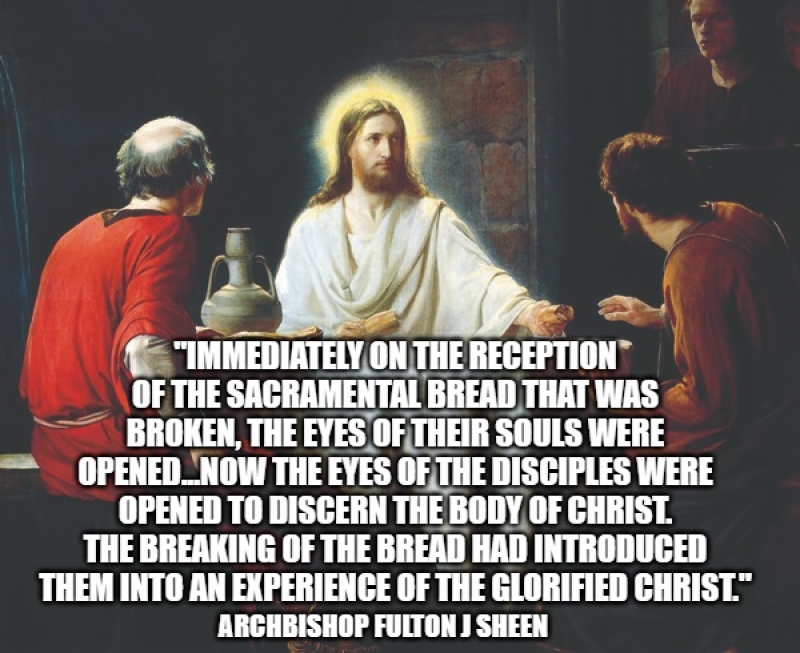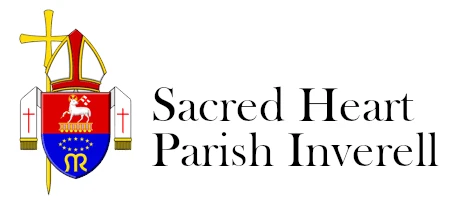3rd Sunday of Easter (Year A) - 23 April
23rd April 2023

3rd Sunday of Easter (Year A) - 23 April
“Imitate the virtues of the Blessed Virgin, particularly her profound humility, her lively faith, her blind obedience, her continual prayer.” - St Louis Marie de Monfort
A reflection on today's Gospel by the Venerable Archbishop Fulton J Sheen:
"On that same Easter Sunday, Our Blessed Lord made another appearance to two of His disciples who were on their way to a village named Emmaus, which was a short distance from Jerusalem. No subject was more in men’s minds that particular day than the Person of Christ. As they were discoursing with sad and anxious hearts on the awful incidents of the last two days, a Stranger drew near to them. Their eyes, however, were held fast so that they did not recognise that it was the Risen Saviour; they thought Him to be an ordinary traveller. As the story unfolded, it became clear that what blinded their eyes was their unbelief; had they been expecting to see Him, they might have recognised Him. Because they were interested in Him, He vouchsafed His Presence; because they doubted His Resurrection, He concealed the joy and knowledge of His Presence. Now that His Body was glorified, what men saw of Him depended on His willingness to reveal Himself and also on the disposition of their own hearts. Though they did not know Our Lord, they nevertheless were ready to enter into discussion with the Stranger concerning Him.
"Obviously, the reason these disciples were sad was because of their bereavement. They had been with Jesus; they had seen Him arrested, insulted, crucified, dead, and buried. The Saviour with His infinite wisdom did not begin by saying, 'I know why you are sad.' His technique was rather to draw them out; a sorrowful heart is best consoled when it relieves itself. If their sorrow would have a tongue and speak, He would have an ear and reveal. If they would but show their wounds, He would pour in the oil of His healing.
"The risen Lord asked: ‘What happenings?’ He called their attention to facts. They apparently had not gone deeply enough into the facts for proper conclusions. The cure for their sorrow was in the very things that disturbed them, to see them in their right relations. As with the woman at the well, He asked a question, not to get information, but to deepen knowledge of Himself. Then not Cleophas alone but also his companion told Him what had happened.
"These men had hoped great things, but God, they said, had disappointed them. Man draws a blueprint and hopes that God in some way will rubber-stamp it; disappointment is often due to the triviality of human hopes. Original drawings now had to be torn up— not because they were too great, but because in the eyes of God they were too little. The hand that broke the cup of their petty desires offered a richer chalice. They thought that they had found the Redeemer before He was crucified, but actually they had discovered a Redeemer crucified. They had hoped for a Saviour of Israel, but were not expecting a Saviour of the Gentiles as well. They must have heard Him say on many occasions that He would be crucified and rise again, but they could not fit catastrophe into their idea of a Master. They could believe in Him as a Teacher, as a political Messiah, as an ethical reformer, as a saviour of the country, a deliverer from the Romans, but they could not believe in the foolishness of the Cross; nor did they have the faith of the thief hanging on the cross. Hence they refused to regard the evidence of which the women had told them. They were not sure even that the women had seen angels. Possibly it was only an apparition. Furthermore, it was the third day which had come and gone, and He had not been seen. But all the while they were walking and talking with Him.
"There seemed to be a double purpose in the appearance of Our Saviour after His Resurrection, one to show that He Who died had risen, the other, that though He had the same Body, it was now glorified and not subject to physical restrictions. Later on, He would eat with His disciples to prove the first; now, as with the Magdalen whom He forbade to touch Him, He stressed His risen state.
"With these disciples as with all of the Apostles, there was no predisposition to accept the Resurrection. The evidence for it had to make its way against doubt and the most obstinate refusals of human nature. They were among the last people in the world to credit such a tale. One might almost say that they were resolved to be miserable, refusing to enquire into the possibility of the truth of the story. Resisting both the evidence of the women and the confirmation of those who had gone to verify their story, the final word was that they had not seen the risen Lord.
"They are accused of being foolish and slow of heart (Luke 24:25-26), because if they had ever sat down and examined what the prophets had said about the Messiah - that He would be led like a lamb to slaughter—they would have been confirmed in their belief. Credulity toward men and incredulity toward God is the mark of dull hearts; readiness to believe speculatively and slowness to believe practically is the sign of sluggish hearts. Then came the key words of the journey. Previously, Our Blessed Lord had said that He was the Good Shepherd, that He came to lay down His life for the Redemption of many; now in His glory, He proclaimed a moral law that in consequence of His sufferings men would be raised from a state of sin to fellowship with God.
"The Cross was the condition of glory. The Risen Saviour spoke of a moral necessity grounded on the truth that everything that happened to Him had been foretold. What seemed to them an offense, a scandal, a defeat, a succumbing to the inevitable was actually a dark moment foreseen, planned, and preannounced. Though the Cross seemed to them incompatible with His glory, to Him it was the appointed path thereto. And if they had known what the Scriptures had said of the Messiah, they would have believed in the Cross. He showed to them all the types and all the rituals and all the ceremonials that were fulfilled in Him. Quoting from Isaiah, He showed the manner of His death and Crucifixion and His Last Words from the Cross; from Daniel, how He was to become the mountain that filled the earth; from Genesis, how the seed of a woman would crush the serpent of evil in human hearts; from Moses, how He would be the brazen serpent that would be lifted up to heal men of evil, and how His side would be the smitten rock from which would come the waters of regeneration; from Isaiah, how He would be Emmanuel, or 'God with us' from Micah, how He would be born in Bethlehem; and from many other writings He gave them the key to the mystery of God’s life among men and the purpose of His coming.
"At last they arrived at Emmaus. Their invitation to be a guest He accepted, but immediately He acted as the Host for: ‘When He sat down at table with them, He took bread, and blessed, and broke it, and offered it to them; whereupon their eyes were opened, and they recognised Him; And with that, He disappeared from their sight’ (Luke 24:30-31).
"This taking of the bread and breaking it and giving it to them was not an ordinary act of courtesy, for it resembled too closely the Last Supper at which He bade His Apostles to repeat the Memorial of His death as He broke the bread which was His Body and gave it to them. Immediately on the reception of the Sacramental Bread that was broken, the eyes of their souls were opened. As the eyes of Adam and Eve were opened to see their shame after they had eaten the forbidden fruit of the knowledge of good and evil, so now the eyes of the disciples were opened to discern the Body of Christ. The scene parallels the Last Supper: in both there was a giving of thanks; in both, a looking up to heaven; in both, the breaking of the bread; and in both, the giving of the bread to the disciples. With the conferring of the bread came a knowledge which gave greater clarity than all the instructions. The breaking of the bread had introduced them into an experience of the glorified Christ. Then He disappeared from their sight.
"His influence upon them was both affective and intellectual: affective, in the sense that it made their hearts burn with love; and intellectual, inasmuch as it gave them an understanding of the hundreds of preannouncements of His coming. Mankind is naturally disposed to believe that anything religious must be striking and powerful enough to overwhelm the imagination. Yet this incident on the road to Emmaus revealed that the most powerful truths often appear in the commonplace and trivial incidents of life, such as meeting a fellow traveller on a road. Christ veiled His Presence in the most ordinary roadway of life. Knowledge of Him came as they walked with Him; and the knowledge was that of glory that came through defeat. In His Glorified Life as in His public life, the Cross and glory went together. It was not just His teachings that were recalled; it was His sufferings and how expedient they were for His exaltation.
"The disciples immediately returned and went back to Jerusalem. As the woman at the well in her excitement left her water pitcher at the well, so these disciples forgot the purpose of their journey to Emmaus and went back to the Holy City. There they found the eleven Apostles gathered together, and with them other followers and disciples. They recounted all that had happened on the way and how they recognised Him in the breaking of the bread." (Life of Christ)
Prayer Seeking God’s Guidance by St Benedict
Gracious and holy Father, please give me intellect to understand You, reason to discern You, diligence to seek You, wisdom to find You, a spirit to know You, a heart to meditate upon You, ears to hear You, eyes to see You, a tongue to proclaim You, a way of life pleasing to You, patience to wait for You, and perseverance to look for You. Grant me a perfect end, Your holy presence, a blessed resurrection, and life everlasting. Amen. 💖💐🙏
Food for thought
Alfred Edersheim, a Jewish scholar who converted to Christianity, and who knew the Old Testament and all of the old traditions of the Jews very well, stated that at the time of Christ the rabbis had gathered together 456 prophecies concerning the Messiah, the Christ, the conqueror of evil who was to be born and to enter into a new covenant with mankind. Suppose the chances of any one prophecy being fulfilled by accident, say the place where He would be born, was one in a hundred. Then, if two prophecies were fulfilled, the chances would be one in a thousand. If three prophecies were to coincide in Christ, that would be one in ten thousand. If four, one in a hundred thousand. If five, one in a million. Now if all of these prophecies were fulfilled in Christ, what would be the chance of them all concurring at the appointed moment, not only in place but also in time, as was foretold by the prophet Daniel? Take a pencil and write on a sheet of paper the numeral 1, and draw a line beneath it. Under the line write 84, and after 84, if you have time, write 126 zeros. That is the chance of all of the prophecies of Christ being fulfilled. It runs into millions and millions, trillions and trillions.


